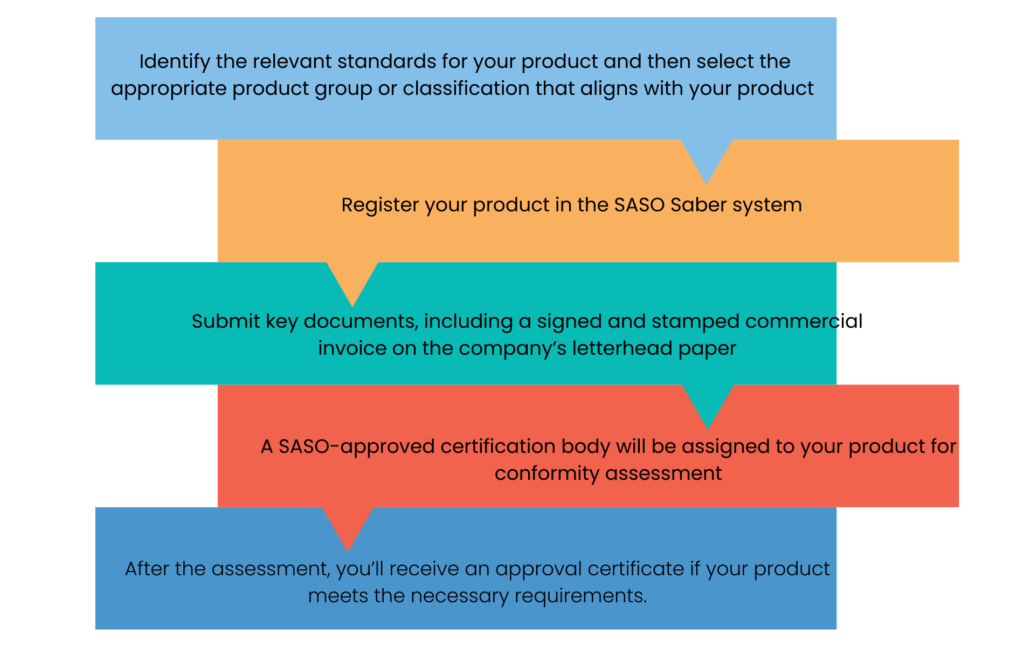SASO Certificate of Conformity, Saleem & Saber System
Meet all SASO requirements for Saudi Arabia to get your goods certified for export.
Streamlined SASO Certification and Compliance for Imports in Saudi Arabia
Products Requiring SASO certificate of Conformity
SASO IECEE Recognition Certificate: Certain products need the SASO IECEE Recognition Certificate for clearance. As of specific dates:
September 1, 2021:
- Electric oil fryers
- Electrical cables
- Water boilers (kettles)
- Coffee preparation devices
- Electronic pumps with a capacity of 5 horsepower or less for all uses
- Video game devices and their accessories (e.g., consoles, controllers, wireless headsets, chargers)
- Earphones with microphone and speakerphone.
January 1, 2023:
- Shaving devices (electric hair clippers for humans and animals, including battery-operated ones)
- Circuit breakers (sub and mains)
- Charger and data transfer cables for mobile phones
- Desktop computers.
SALEEM
The SALEEM program involves implementing regulations and standards to enhance consumer protection and promote the safety of products sold in the Kingdom of Saudi Arabia
It issues SASO certificate system, replacing previous product certification program, aiming to enhance product safety standards. Under SALEEM, products are categorized into regulated and non-regulated groups based on their level of risk.
To enforce safety measures effectively, SASO, the Saudi Standards, Metrology, and Quality Organization, have issued technical regulations outlining specific requirements and certificate schemes for each product category. And, covers a wide range of products, including electrical and electronic appliances, toys, cosmetics, and construction materials.
Under SALEEM, products must undergo conformity assessment procedures, which may include testing, inspection, and certification, to demonstrate compliance with the applicable Saudi Arabian standards and regulations. This process helps ensure that products meet the necessary safety, quality, and performance requirements before they are allowed to be imported, distributed, or sold in the Saudi market.
By launching the SALEEM program, SASO aims to improve product safety, enhance consumer confidence, and facilitate trade by establishing clear and transparent regulations for product compliance in Saudi Arabia. Manufacturers, importers, and distributors are required to comply with the SALEEM regulations to ensure that their products meet the necessary standards and requirements for market access in Saudi Arabia.
Process for obtaining a SASO Certificate

Certificates
Product Certification of Conformity (PCoC): Issued online for each regulated product, valid for one year.
Shipment Certificate of Conformity (SCoC): Verified for existing valid PCoCs in the shipment
SABER
SASO introduced the SABER system as a centralized online platform for registering all imported products, facilitating the issuance of necessary certificates for importation. The primary objective of this system is to streamline and improve the certification process for imported goods, with a vision for it to become mandatory for all products entering Saudi Arabia.
Through the SABER system, manufacturers and exporters can electronically submit the required documentation and information needed for certification and conformity assessment. This electronic platform not only expedites the clearance process but also ensures transparency and efficiency in import procedures, benefiting both businesses and regulatory authorities.
Related Services
Click here to know about the Approval Process for the Canadian Market
Click here to know about the Approval Process for the Canadian Market
Click here to know about the SRCC certifications
Click here to know everything about Type Approval for Fiji
Click here to know everything about Type Approval for Hong Kong
Click here to know everything about India Approvals
Click here to know everything about PSE Mark
Click here to know everything about MIC Certificate
Click here to know everything about Type Approval for Malaysia
Click here to know everything about Type Approval for Saudi Arabia
Click here to know everything about Type Approval for South Africa
Click here to know everything about Type Approval for Singapore
Click here to know everything about NCC Certificate
Click here to know everything about BSMI Mark
Click here to know everything about Type Approval for USA
Process to obtain SABER
Account Registration
Importers create an account on the SABER system.
Product Registration
Importers register their products by providing details such as HS code (Harmonized System code) and category.
Risk Level Classification
The system classifies the risk level based on the HS code
Self Declaration with Document Support
Importers submit a self-declaration along with supporting documents
Obtain Type Approval Certificate (Product Certificate)
Once approved, importers receive a Type Approval Certificate for their non-regulated products.
Regulated Product (Medium/High-risk):t
For regulated products, importers need to obtain a Shipment Certificate from the SABER system
In summary, SALEEM sets the standards and requirements, while SABER acts as the digital gateway for certification processes in the KSA market. Together, they ensure product quality, safety, and compliance with regulations13.
Company Strengths at a glance
Why C-PRAV?
C-PRAV is known for its quick turnaround times and personalized service. Our proficiency lies in understanding and navigating the intricacies of Saudi Arabian standards and requirements. We provide comprehensive expertise and knowledge across a diverse range of services in the Gulf region.
Comprehensive Support
Guide you and manage all Saudi Arabian Product Certification. We help resolving queries, clarifications, and any issues that may arise during the certification process
Expert Knowledge
C-PRAV has in-depth knowledge and understanding of the SASO and SABER systems, including the regulatory requirements, documentation, and processes involved. We can guide businesses on the specific steps needed to achieve certification
Cost-Effective Solutions
We understand the importance of tailored solutions. We recognize that every product is unique, which is why we specialize in customizing compliance strategies to perfectly align with your specific needs and budget. Our comprehensive, end-to-end service is designed to be cost-effective while delivering exceptional results
We Have Great Answers
Ask Us Anything
Yes, SABER allows applicants to apply for various certificates, including SASO Certificates of Conformity (CoC), Product Certificates, and Shipment Certificates of Conformity (SCoC), depending on the product and regulatory requirements.
SALEEM establishes regulations and standards, while SABER provides the electronic platform for certification and clearance processes. Compliance with SALEEM regulations requires utilization of the SABER platform for certification and registration purposes.
SOC (Shipment Certificate of Conformity) and POC (Product Certificate of Conformity) are two types of certificates issued under the SABER system for importation into Saudi Arabia. SOC certifies the conformity of each shipment, while POC certifies the conformity of individual products.
Yes, products subject to SALEEM certification must be registered on the SABER platform to obtain necessary certificates for importation into Saudi Arabia. SABER serves as the central repository for registering imported products and issuing certificates.
Yes, SALEEM establishes regulations for various product categories, including electronics, toys, cosmetics, and building materials. SASO publishes detailed information on regulated products and applicable standards.
The specific documentation required may vary depending on the type of product and applicable regulations. Generally, applicants need to provide product specifications, test reports, and other relevant documents.
Saudi Arabia Regulatory Updates
Saudi Arabia Implements Mandatory USB Type-C Charging Port Requirement
Effective 1 January 2025, the Communications, Space and Technology Commission (CST) and the Saudi Standards, Metrology and Quality Organization (SASO) have launched the first mandatory phase of unified charging ports for electronic devices placed on the Saudi market. Under this initiative, all covered electronic devices must be equipped with a USB Type-C charging port in order to be sold in Saudi Arabia. This measure forms part of Saudi Arabia’s broader effort to standardise charging interfaces,
Saudi Arabia Unveils First Smart WiFi-7 Network
On May 5, 2025, the King Abdullah Financial District Development and Management Company (KAFD DMC), in collaboration with Huawei, launched Saudi Arabia’s first Smart WiFi-7 service. This milestone significantly boosts wireless connectivity within the KAFD and marks a major leap forward in the Kingdom’s digital transformation agenda, particularly within the telecommunications sector. Driving Digital Growth Under Vision 2030 The deployment of WiFi-7 at KAFD represents a major step toward realizing Saudi Arabia’s Vision 2030, which
Saudi Arabia – CST Revises IoT Regulatory Framework
The Communications, Space, and Technology Commission (CST) has revised its “IoT Regulatory Framework” and renamed it “IoT Regulations.” This update aims to encourage investment and innovation in the Internet of Things (IoT), improve service quality and efficiency, enhance user experience, and strengthen the regulatory environment in Saudi Arabia. A key update is the introduction of a requirement for a compliance certificate for all IoT devices imported into and used in the Kingdom. The updated regulations
Saudi Arabia Implements Mandatory USB Type-C Charging Port Requirement
Effective 1 January 2025, the Communications, Space and Technology Commission (CST) and the Saudi Standards, Metrology and Quality Organization (SASO) have launched the first mandatory phase of unified charging ports for electronic devices placed on the Saudi market. Under this initiative, all covered electronic devices must be equipped with a USB Type-C charging port in order to be sold in Saudi Arabia. This measure forms part of Saudi Arabia’s broader effort to standardise charging interfaces,
Saudi Arabia Unveils First Smart WiFi-7 Network
On May 5, 2025, the King Abdullah Financial District Development and Management Company (KAFD DMC), in collaboration with Huawei, launched Saudi Arabia’s first Smart WiFi-7 service. This milestone significantly boosts wireless connectivity within the KAFD and marks a major leap forward in the Kingdom’s digital transformation agenda, particularly within the telecommunications sector. Driving Digital Growth Under Vision 2030 The deployment of WiFi-7 at KAFD represents a major step toward realizing Saudi Arabia’s Vision 2030, which
Saudi Arabia – CST Revises IoT Regulatory Framework
The Communications, Space, and Technology Commission (CST) has revised its “IoT Regulatory Framework” and renamed it “IoT Regulations.” This update aims to encourage investment and innovation in the Internet of Things (IoT), improve service quality and efficiency, enhance user experience, and strengthen the regulatory environment in Saudi Arabia. A key update is the introduction of a requirement for a compliance certificate for all IoT devices imported into and used in the Kingdom. The updated regulations

